It seems we can’t find what you’re looking for. Perhaps searching can help.
Sign Up for newsletter!
Subscribe to get the latest eBook!
Hotline






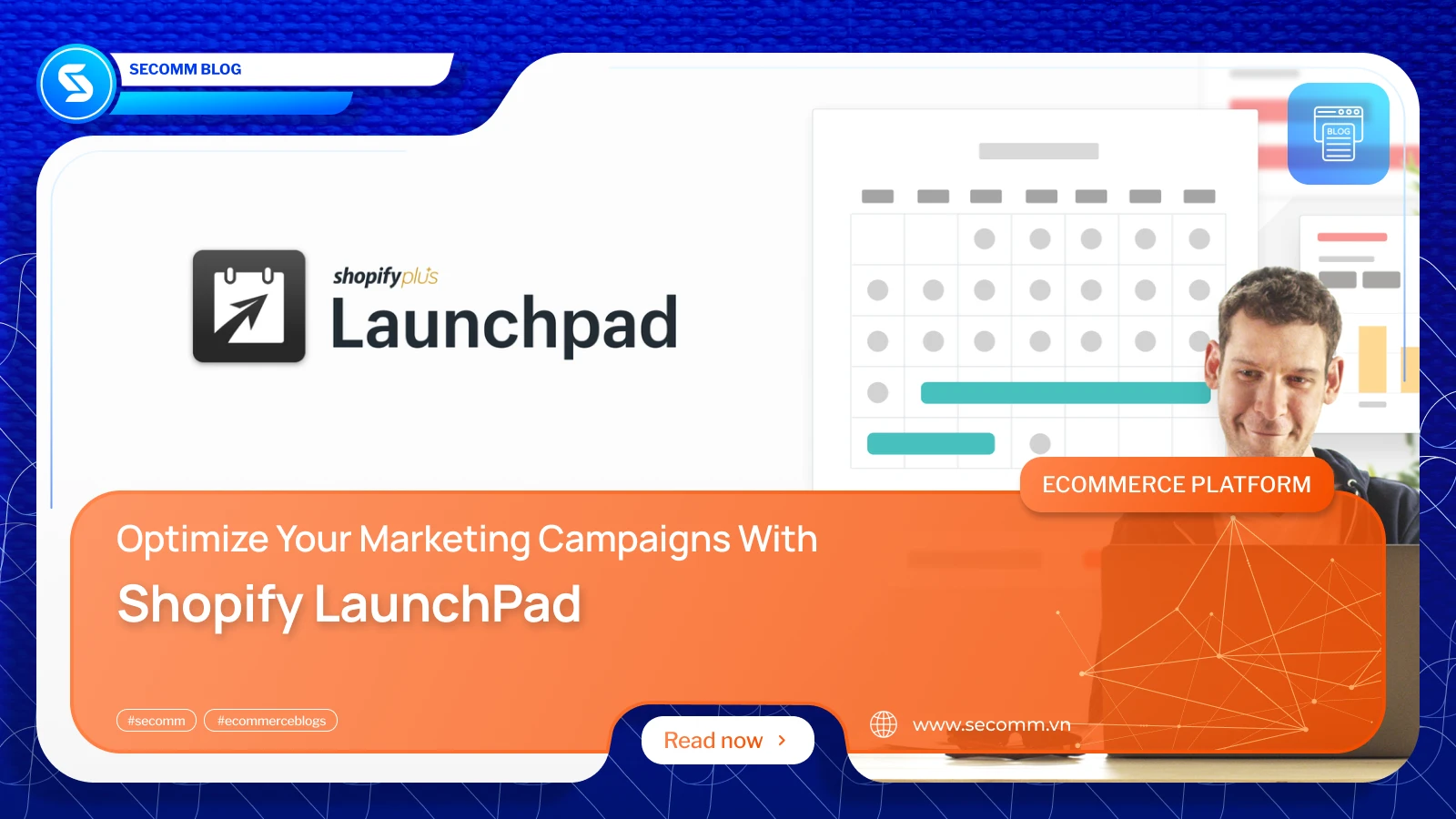
In today’s eCommerce world, staying ahead of the competition requires not only a great product but also effective tools to manage and optimize your store’s operations. Shopify, one of the leading eCommerce platforms, offers a variety of features designed to help businesses thrive. Among these is Shopify LaunchPad, a powerful tool aimed at automating and streamlining promotional events.
In this blog post, we’ll dive into what Shopify LaunchPad is, how it works, and the key features that make it a valuable asset for online store owners. We’ll also explore the benefits and drawbacks of using this tool, helping you decide if it’s the right fit for your business needs. Whether you’re planning a major sale, a product launch, or a special campaign, understanding the capabilities of Shopify LaunchPad can help you execute your strategies more efficiently and effectively.
Shopify LaunchPad is a specialized feature within the Shopify platform designed to facilitate the management and execution of promotional events for e-commerce businesses. It serves as a comprehensive toolset that allows store owners to automate the setup, scheduling, and execution of events such as product launches, flash sales, and holiday promotions.
Essentially, Shopify LaunchPad enables businesses to plan and implement their marketing strategies more efficiently by automating repetitive tasks and ensuring timely execution of events, thereby enhancing overall store management and customer engagement.
There are two common ways to utilize Shopify LaunchPad. One is creating new events, another is modifying the existing events. Let’s break it down:
To create a new LaunchPad event, you’ll follow these steps:
To modifying the existing LaunchPad events, you’ll need to:
Navigate to the LaunchPad events section in your Shopify dashboard.
Shopify LaunchPad offers a comprehensive suite of features designed to enhance the management and execution of promotional events for eCommerce businesses.
Automated Event Scheduling: LaunchPad automates the activation and deactivation of events based on preset start and end dates, eliminating the need for manual intervention and ensuring timely execution of promotional campaigns.
Event Customization: Businesses can extensively customize their promotional events within LaunchPad. This includes defining event types such as sales, product launches, or holiday promotions, setting specific start and end dates (including time zones for global campaigns), configuring discounts (whether percentage-based or fixed amounts), excluding certain products or collections, and customizing promotional messaging and banners to align with branding strategies.
Integration Capabilities: Shopify LaunchPad seamlessly integrates with other Shopify features and third-party apps. It syncs with Shopify’s inventory management to ensure accurate stock availability during promotions, integrates with email marketing tools for targeted promotional campaigns, and connects with analytics platforms to track campaign performance and customer behavior.
Performance Analytics: The platform provides robust analytics and reporting capabilities, offering insights into event performance metrics such as total revenue generated, units sold, average order value, click-through rates, conversion rates, customer acquisition cost, top-performing products, best-selling categories, and geographic sales distribution. This data empowers businesses to make data-driven decisions to optimize future promotions and marketing strategies.
Using Shopify LaunchPad offers several key benefits for eCommerce businesses:
Time-saving through automation: Shopify LaunchPad automates the entire process of setting up and managing promotional events. This includes scheduling events to start and end at specific times, activating discounts or special offers automatically, and deactivating them once the event concludes. By automating these tasks, businesses can save significant time that would otherwise be spent manually coordinating promotions.
Improved sales management: By automating event activation and deactivation, LaunchPad ensures precise control over sales periods, product launches, and promotional campaigns. Businesses can schedule events in advance, allowing for strategic planning and coordination across different channels. This capability not only improves the efficiency of sales management but also enhances the effectiveness of promotional efforts by ensuring timely execution and optimized sales strategies.
Enhanced customer experience: Streamlined and well-managed promotional events contribute directly to a better shopping experience for customers. With LaunchPad, businesses can communicate promotions clearly and effectively to their audience, reducing confusion and improving transparency. Timely execution of promotions also enhances customer satisfaction by delivering on expectations and providing a seamless shopping experience.
Reach new potential customers: Shopify LaunchPad is instrumental in helping businesses reach new audiences and expand their customer base. Whether through targeted promotions, cross-channel campaigns, or innovative marketing strategies, LaunchPad enables businesses to attract and engage with new potential customers effectively.
While Shopify LaunchPad offers significant benefits, it also has certain limitations that businesses should consider:
Dependence on Proper Setup: The effectiveness of LaunchPad heavily relies on the accurate setup of events, including dates, discounts, and promotional content. Improper configuration or oversight in setup can lead to inconsistencies in promotions or missed opportunities to maximize sales.
Analytics and Reporting Depth: While LaunchPad provides basic analytics and reporting on event performance, businesses looking for advanced analytics capabilities or deeper insights may find the built-in features somewhat limited. Integrating with external analytics tools may be necessary for more comprehensive data analysis.

Cheak, an innovative sportswear brand, leveraged Shopify LaunchPad to streamline its product launches and manage seasonal sales effectively. By scheduling product releases and flash sales in advance, Cheak was able to create buzz and anticipation among its customer base. The automation provided by LaunchPad ensured that promotions started and ended precisely as planned, enhancing the overall shopping experience and boosting sales during peak periods. By using Shopify LaunchPad, Cheak increased 20% month-on-month growth in online store traffic, 100% month-on-month rise in Malaysian expansion store visits, and reduced product launch time, from 1 week to 2 days.
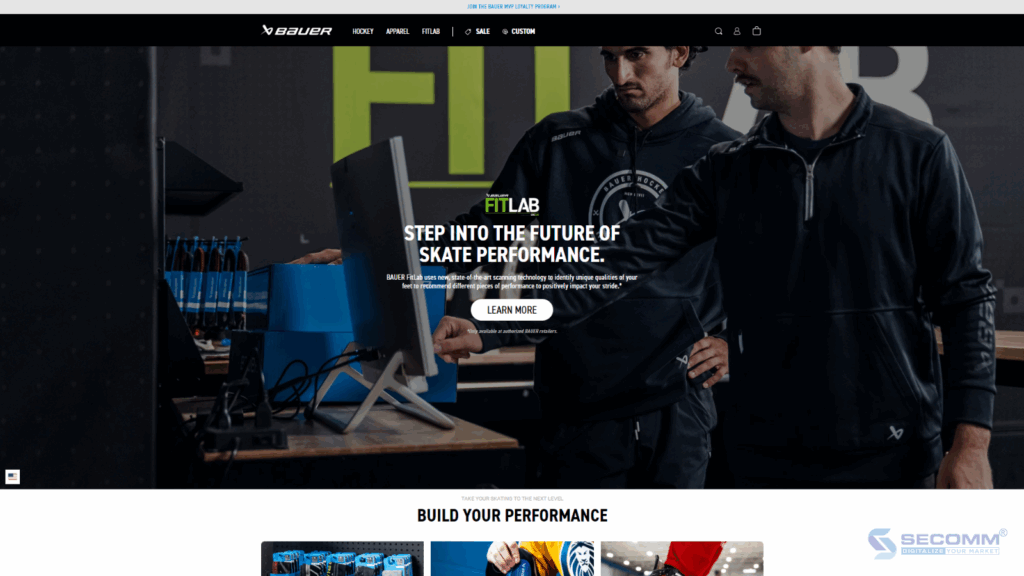
Bauer, a renowned hockey equipment manufacturer, used Shopify LaunchPad after re-platform from Salesforce Commerce Cloud to coordinate large-scale promotional events across multiple regions. By utilizing LaunchPad’s scheduling and automation features, Bauer was able to synchronize discounts and special offers for major events like Black Friday and Cyber Monday. This approach not only simplified the management of these complex campaigns but also maximized their impact, resulting in significant increases in both online traffic and sales.
Shopify Plus and the LaunchPad feature has helped Bauer with 60% revenue increase, 30% order increase, 20% cost savings, 18% conversion rate increase since moving to Shopify, within 6 months year-over-year.
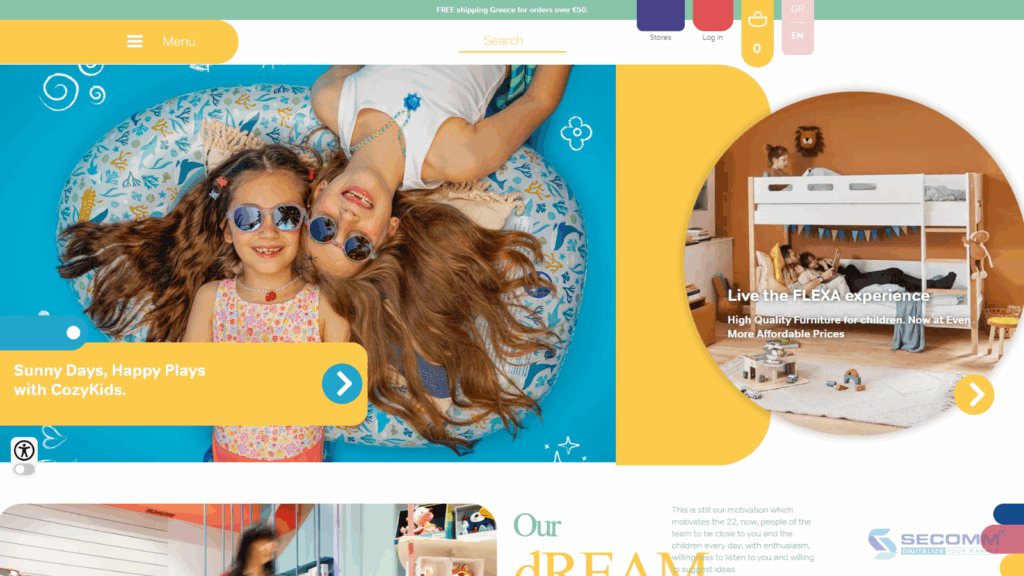
Cozykids, a popular children’s clothing retailer, implemented Shopify LaunchPad to manage its frequent sales and special promotions. The brand utilized LaunchPad to automate discount application and promotional messaging, ensuring a seamless and consistent customer experience. With LaunchPad, Cozykids could easily modify ongoing events and respond quickly to market trends, leading to improved customer engagement and satisfaction. By using LaunchPad, Cozykids has seen: 40% site traffic increased, 82% revenue increased, human error reduced and stock management efficiency increased.
Shopify LaunchPad is a powerful tool that can transform the way eCommerce businesses manage and execute promotional events. By automating event scheduling, enhancing sales management, and improving customer experiences, LaunchPad offers significant benefits. However, it also has limitations that businesses need to consider. Real-world examples like Cheak, Bauer, and Cozykids showcase its potential to drive sales and engagement effectively. Overall, Shopify LaunchPad is a valuable asset for any eCommerce store looking to streamline its promotional strategies and achieve better results.
Want to implement Shopify LaunchPad right now? Contact SECOMM for free consultation!
 113
113
 6,430
6,430
 1
1
 40
40
The jewelry world always holds mystical and captivating beauty. Capitalizing the eCommerce development, many jewelry brands have embraced the opportunity to connect with users worldwide and establish a distinctive presence through their eCommerce websites.
Shopify, renowned for its versatility, is a favored platform for crafting unique and dynamic interfaces and user experiences, captivating millions of jewelry enthusiasts across the globe.
Below is a list of the top 10 most prominent Shopify eCommerce jewelry websites, where creativity meets technological solutions to create unique art pieces that have won the hearts of jewelry enthusiasts everywhere.
Learn more: What opportunities are open to Jewelry eCommerce?
Originating from New York, USA, ANA LUISA is a prominent jewelry brand with a beauty-centric vision, offering unique and elegant jewelry pieces. ANA LUISA carefully selects premium materials such as 14k gold, 925 silver, lab-grown diamonds, and cultured pearls to craft diverse jewelry collections suitable for every style and personality.
By leveraging Shopify, the ANA LUISA jewelry website has streamlined its development process, swiftly bringing products to market.
The website features a simple and elegant design with a white color scheme, well-suited to the accessories and jewelry industry. ANNA LUISA focuses on developing advanced features to provide the best online shopping experience for customers.
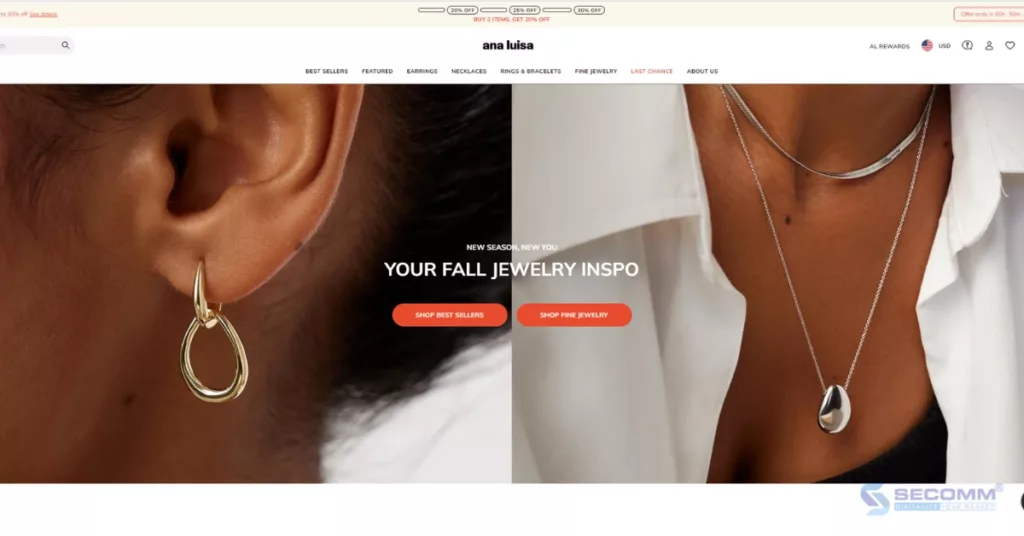
Notable features include Order Tracking by order number and zip code; Quick View of products; Pre-order with notification alerts; Product recommendations based on viewing history, and displaying the quantity of products sold in the last 24 hours.
PD Paola is a famous jewelry brand from Spain, drawing inspiration from the blend of modern and refined designs with classical lines. PD Paola often presents diverse jewelry collections, including necklaces, rings, earrings, and more.
The brand is committed to ensuring sustainability in the production process, making its products beautiful and environmentally friendly.
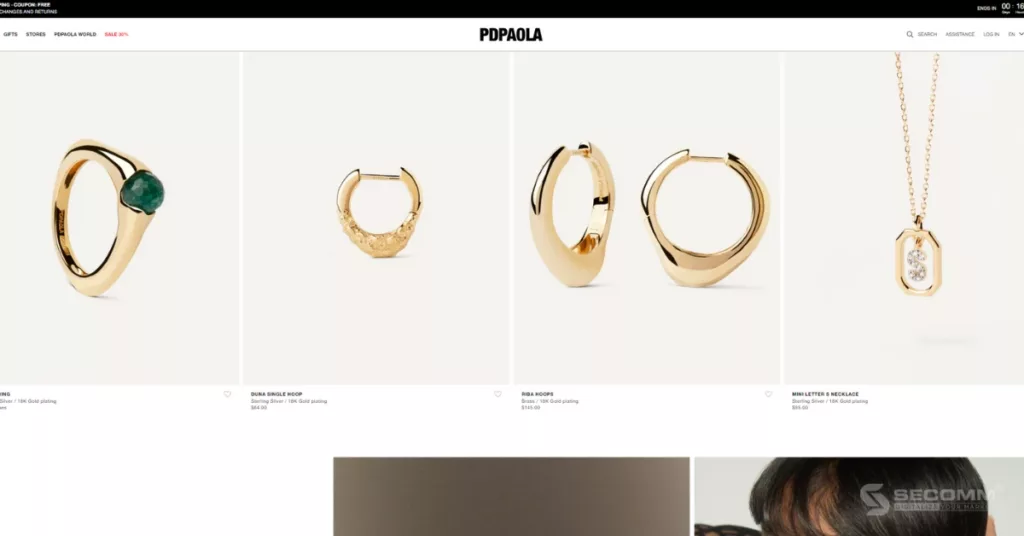
PD PaolaPD Paola has built a Shopify website to showcase its products to a large potential customer base on the internet. Through the eCommerce website, PD Paola has incorporated several unique features to enhance the online shopping experience, including Image Zoom, Cross-sell product recommendations, and Recently viewed product display.
Or, Product size options, Payment options with credit cards and PayPal, Intelligent search suggestions with popular, recent, and trending keywords, and Scheduling appointments at offline stores.
Learn more: The Journey of Building a Jewelry eCommerce Website
Missoma is a jewelry brand based in London, UK, specializing in gold and silver recycled jewelry with modern, sophisticated, and distinctive designs. The brand features several outstanding jewelry collections, such as Lucy Williams, Harris Reed, Savi, Zenyu, Molten, and many more.
The design of Missoma’s eCommerce website reflects the elegance and minimalism of the jewelry industry. The decision to deploy a Shopify website has brought the ability to integrate diverse and user-friendly third-party apps, providing customers with a more enriching and high-quality shopping experience.

MissomaSome advanced features of Missoma include Diverse payment methods integration, including Buy Now Pay Later with Klarna; Automatic multi-currency feature that converts currencies based on the user’s IP; Product filtering based on material, and size; Integration of The Rewards Stack loyalty program.
Founded by Michael Saiger in 2008, Miansai is a leading American jewelry brand. Miansai specializes in creating simple, elegant, and unique men’s and women’s jewelry, using carefully selected and handcrafted raw materials.
The brand offers various jewelry collections, including necklaces, bracelets, rings, earrings, keychains, and many other accessories.

MiansaiMiansai has also built and developed a Shopify jewelry website to provide customers with industry-specific features, including Product size selection; Filtering and searching for products and collections; Automatic currency conversion based on the user’s IP. Or, Search suggestions; Integration with social media platforms such as Facebook, Pinterest, Instagram.
Astrid & Miyu, a London-based fashion jewelry brand, has long been a familiar name in the international jewelry industry. One of the notable features of Astrid & Miyu is the ability to flexibly combine their jewelry products.
The brand focuses on creating designs that can layer and combine creatively. This allows users to create unique jewelry experiences and express their style.

Astrid & MiyuAstrid & Miyu’s jewelry website is built on the Shopify platform to provide an optimal shopping experience for customers with unique features. Among these features are Zoom product view; Product color options; and In-store product availability check.
Or, Search suggestions; Loyalty points accumulation; Gift options; Payment options (Amazon Pay, Shop Pay, Google Pay); and Scheduling appointments at any store.
QALO is a special jewelry brand that focuses on producing silicone rings, especially those that combine a variety of designs and purposes. The name “QALO” stands for “Quality, Athletics, Love, Outdoors,” indicating that the brand emphasizes quality, athletic features, family love, and readiness for outdoor adventures.
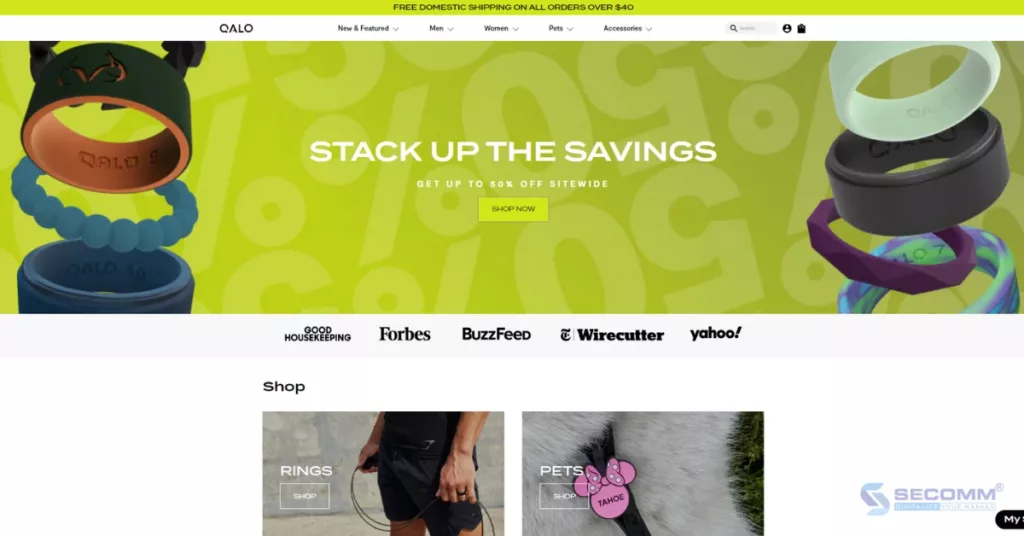
QALOQALO also built their eCommerce website with Shopify, a platform chosen by many leading jewelry brands. Some unique features of the QALO jewelry website include displaying products by category, showcasing popular products, color and size options for products, and the option of Buy Now Pay Later (BNPL) with Shop Pay.
Additionally, QALO allows order tracking, reviewing product viewing history, and shopping on “My Shop.”
Daisy Jewellery is a famous jewelry brand with origins in the United Kingdom. The brand stands out with unique jewelry designs that often incorporate natural elements, honoring the natural beauty of flowers, leaves, and gemstones.
Daisy Jewellery focuses on using natural gemstones, including rose quartz, pearls, and sunstone. Their products are often made from sterling silver 925 or thin layers of gold, ensuring quality and durability.
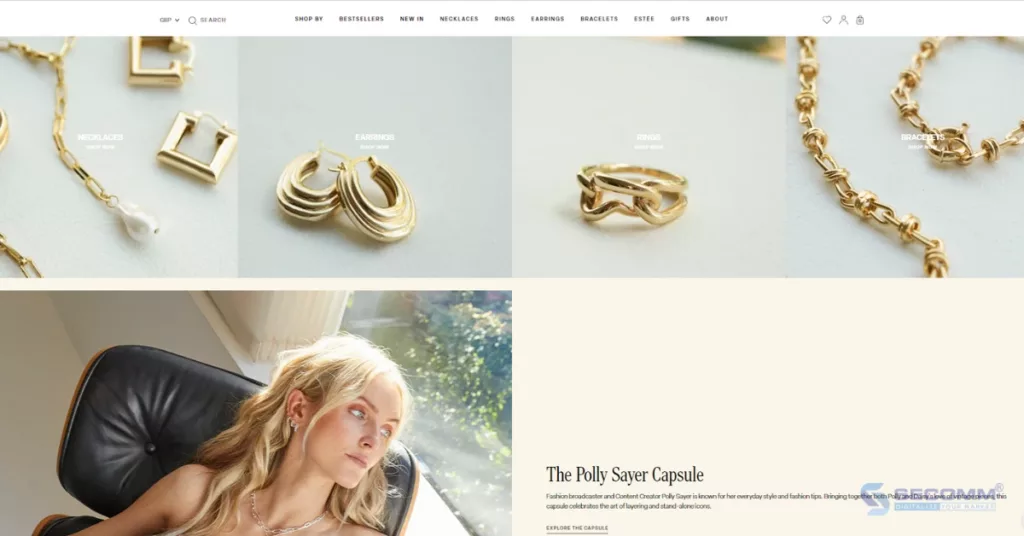
Daisy JewelleryThe brand has implemented Shopify to enhance its online presence. Daisy Jewellery’s eCommerce website provides users with a unique shopping experience, featuring outstanding features such as displaying product images and videos, size, and material options (Gold or Silver).
Or, showing product recommendations on the product and cart pages, displaying product reviews, payment options with Shop Pay, PayPal, Google Pay, Klarna, packaging options, gift order options, and automatic international shipping fees.
STONE AND STRAND is a jewelry brand established in 2013 in the United States. STONE AND STRAND offers a range of jewelry products, including rings, necklaces, earrings, and various other jewelry designs. All products are meticulously designed with exquisite details, reflecting the brand’s creative vision.
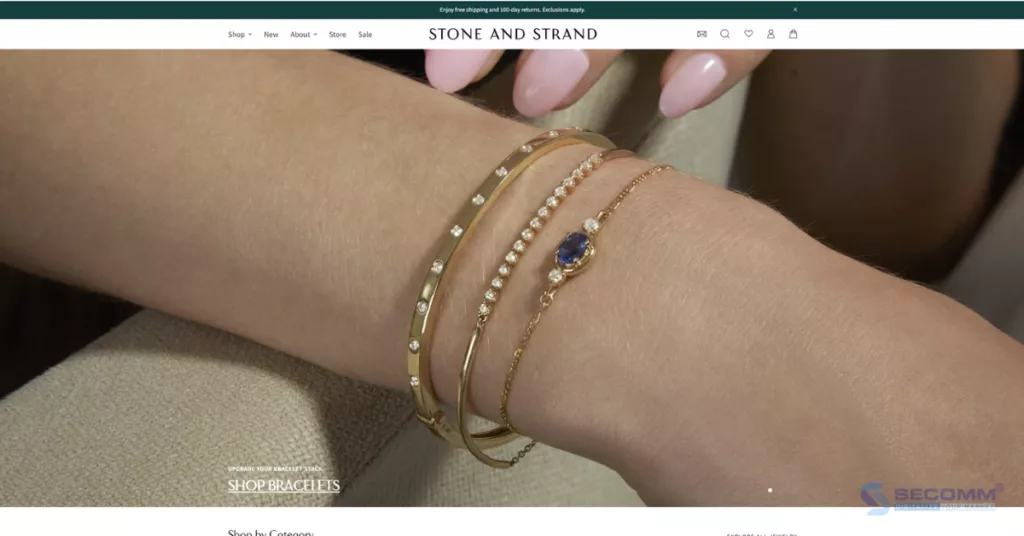
STONE AND STRAND Shopify websiteLike many jewelry brands worldwide, STONE AND STRAND has implemented Shopify for its eCommerce website. The website features an easy-to-navigate product catalog and search functionality, along with order tracking via email and integration of multiple payment methods, including Buy Now Pay Later with Affirm.
Shashi is a fashion jewelry brand founded in 2009 by founder Shashi Singapuri.
Based in New York, the brand is renowned for its unique, innovative, and stylish jewelry products. Shashi creates various types of jewelry, including necklaces, bracelets, earrings, and rings. Vibrant color palettes and distinctive details are highlights of Shashi’s products.

Shashi jewelry websiteThe interface of Shashi’s Shopify eCommerce website features a minimalist style, focusing on showcasing its best-selling and newly launched products. Additionally, the website provides prominent features to enrich the shopping experience for customers.
Some features of Shashi’s jewelry website include color and size options for products, a quick view of the shopping cart, automatic currency conversion based on the user’s IP, and payment options such as Shop Pay and Amazon Pay.
V by Laura Vann is a jewelry brand based in the United Kingdom. Founded by the talented jewelry designer Laura Vann, the brand showcases a creative vision and in-depth knowledge of the jewelry industry. With her innovative vision, Laura Vann has crafted a series of unique and beautiful jewelry designs.
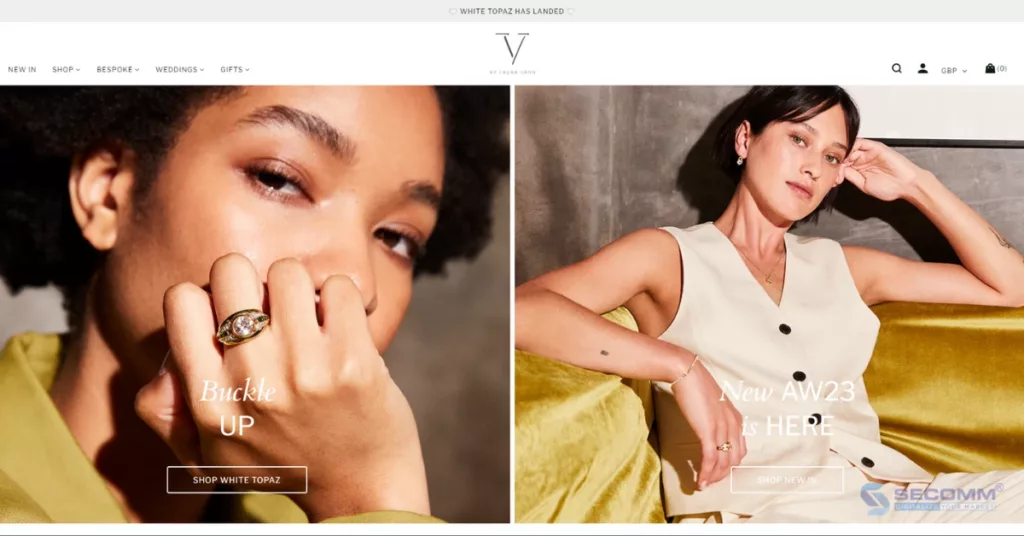
V By Laura Vann’s websiteThe brand’s jewelry website has long been deployed on Shopify to provide customers with an optimal shopping experience, offering various outstanding features through integrations.
Among these features, notable ones include payment options such as Shop Pay (Shopify), Google Pay, credit cards, or BNPL with Klarna; packaging options; and custom designs for jewelry and wedding jewelry.
Above are the top 10 jewelry websites that have made a mark on jewelry enthusiasts worldwide through the implementation of Shopify.
It is evident that owning an optimized eCommerce website not only helps jewelry businesses stand out on the internet but also opens up endless business opportunities. Shopify proves to be a suitable platform for businesses to achieve this quickly.
Learn more: 5 eCommerce platforms for building Jewelry websites
With a dedicated and experienced team, SECOMM can accompany businesses in deploying an outstanding Shopify jewelry website.
Contact SECOMM or call directly at our hotline (028 7108 9908) to embark on the eCommerce journey for jewelry with Shopify today and seize the opportunity to bring your brand and products to millions of potential customers globally.
 3
3
 10,804
10,804
 0
0
 1
1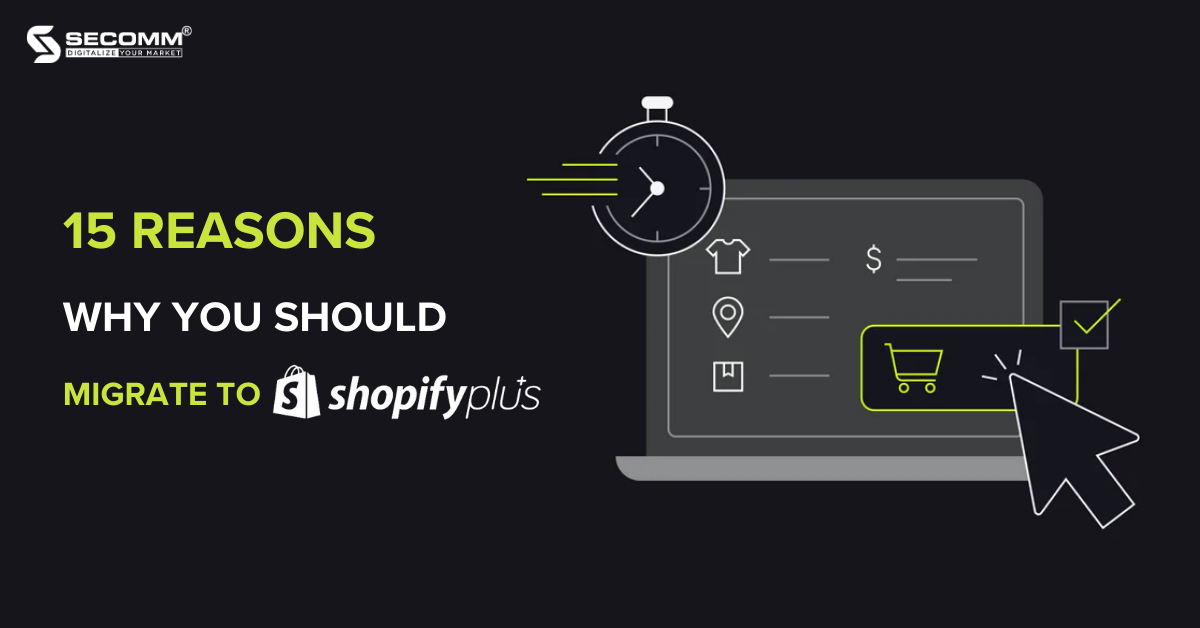
According to the Deloitte 2022 Retail Industry Outlook, up to 67% of businesses acknowledge that the eCommerce platform is their top investment priority due to issues they face with deploying outdated platforms.
Plus, a survey by Digital Commerce 360 revealed that about 27% of businesses are trying to switch their eCommerce platforms despite the associated costs.
Among the myriad of leading platforms today, Shopify Plus stands out as a perfect choice for businesses when deciding to re-platform.
This article will show you 15 reasons why you should migrate to Shopify Plus. Why the platform gains the attention of business leaders and how it can be the key to your development and success in today’s eCommerce landscape.
It is a premium solution of the popular eCommerce platform – Shopify. This version is specifically designed to meet the needs of large businesses with a high investment budget for eCommerce.
It offers flexibility, scalability, and integration, not only helping efficiently build and run an eCommerce website but also providing advanced tools and features to optimize the customer shopping experience.
Here are 15 notable advantages that the platform offers for your business growth, laying the groundwork for you to consider migrating to Shopify Plus.
The dashboard interface is designed to be intuitive and user-friendly, catering to end-users and administrators who directly manage the Shopify store. The intuitive interface allows you to concentrate on developing business strategies and enhancing the customer experience, minimizing the learning curve on how to use the system.
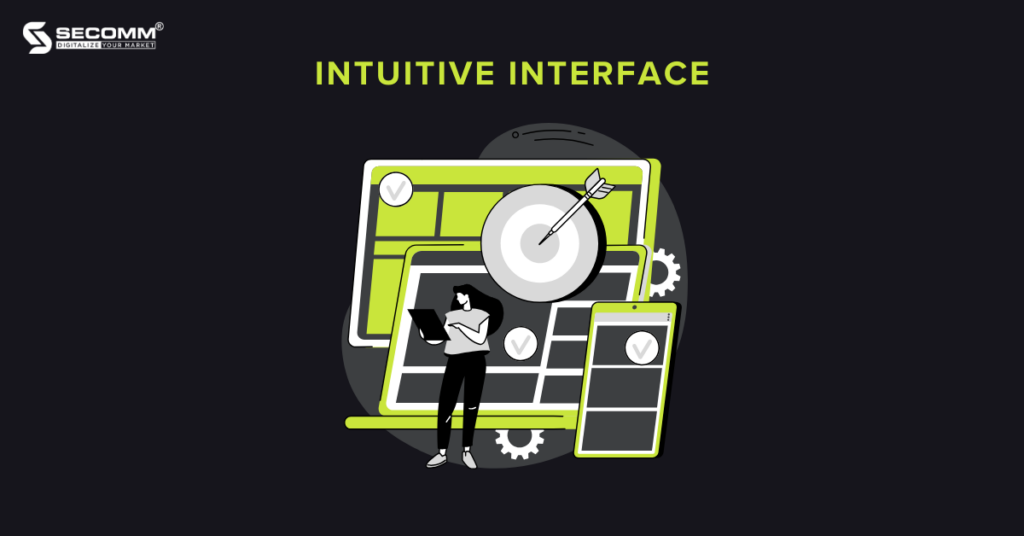
The second reason to migrate to Shopify Plus is the transparency in estimating and managing deployment costs. Typically, when using this platform, you may consider platform fees, transaction fees, app and add-on fees.
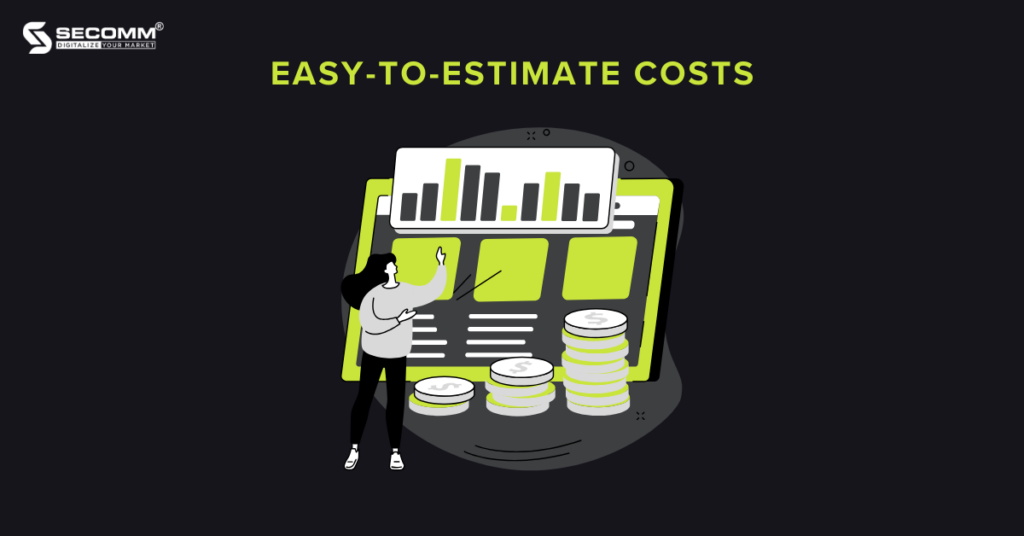
The Shopify Plus pricing system is clear and understandable, helping you know all the fees you need to pay monthly. This helps financial planning, avoiding unexpected fees during the deployment process.
Plus, if you partner with highly specialized technical development teams like SECOMM, we’ll conduct a detailed analysis and propose a phased deployment plan for the Shopify Plus eCommerce website. This approach allows you to gain clarity on how your system will be deployed at each stage, facilitating easy adjustments and flexible optimization of financial resources.
Another advantage of Shopify Plus is the automation feature. The platform provides two exclusive tools to help you facilitate this process: Shopify Flow and LaunchPad.
These automation tools help enhance efficiency and save time by streamlining various processes, allowing you to focus on strategic aspects of your operations.
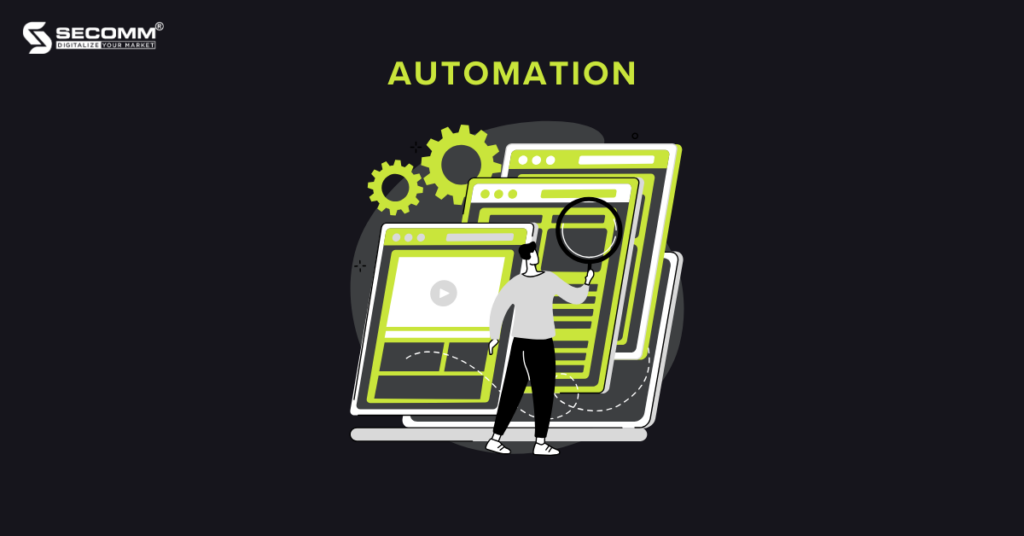
Shopify Plus allows you to reach a broader audience through various sales channels, spanning from offline to online, including leveraging social media for sales and implementing B2B business models.
Plus, you can integrate the Shopify POS solution into their offline stores to offer services such as BOPIS (Buy Online, Pick Up In-Store) and BORIS (Buy Online, Return In-Store). This allows customers to shop in the manner that suits them, combining both online and in-store shopping experiences.
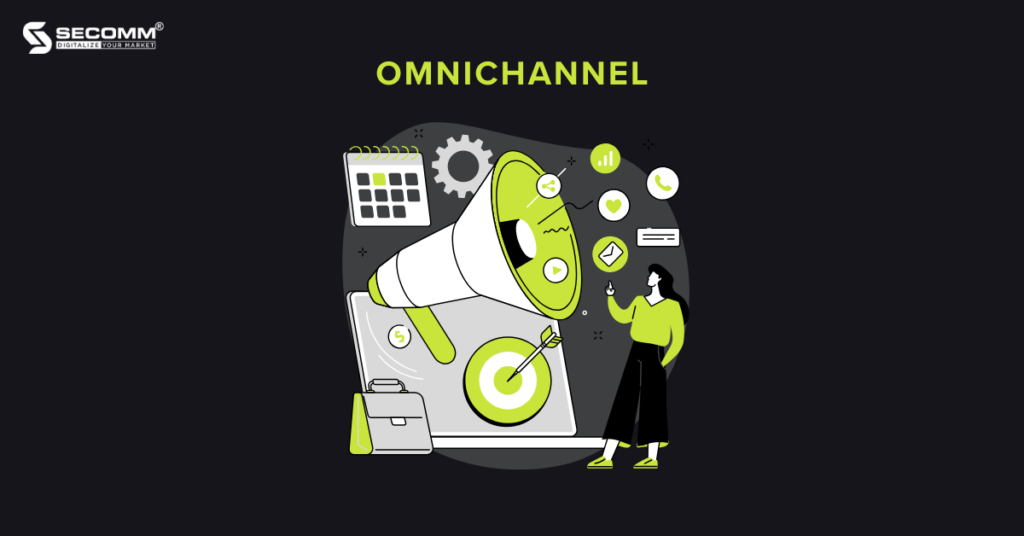
In 2021, Shopify introduced a comprehensive cross-border selling solution called Shopify Markets. With Shopify Markets, you can easily customize their stores for each specific target market. This includes setting prices, languages, payment methods, and delivery options to align with the preferences of local customers.
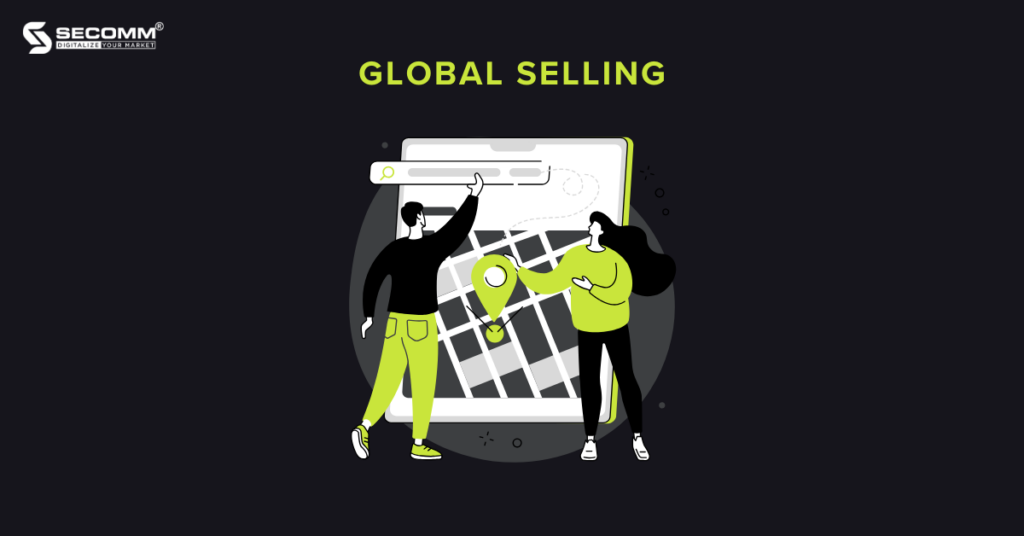
The robust customization is another reason for businesses to switch to Shopify Plus. This platform allows you to freely customize from the frontend to the backend without being constrained by any limits. In particular, you can easily customize the backend with Shopify Functions and Function APIs. Some use cases for Shopify Functions include:
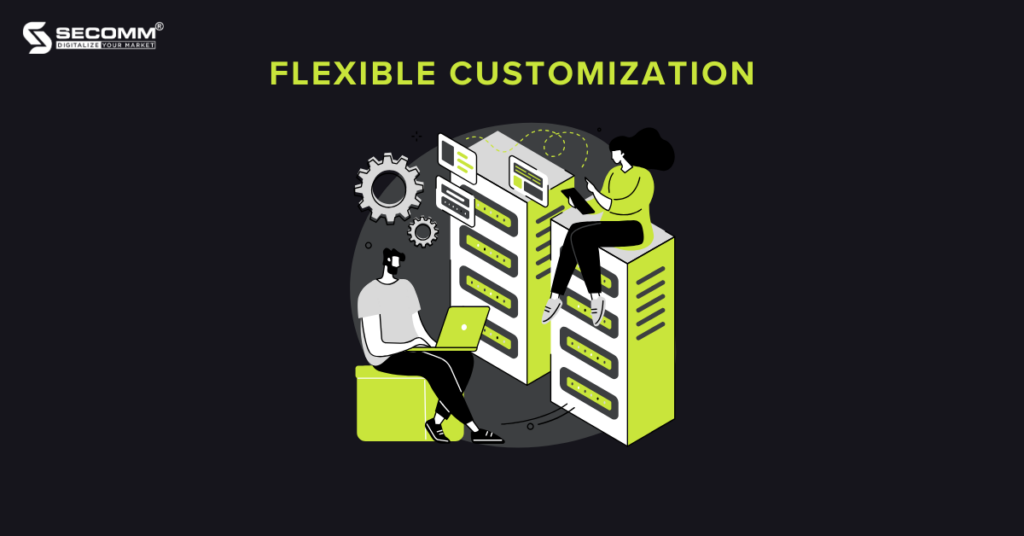
With the popularity of Shopify and Shopify Plus globally, it’s not surprising that Shopify owns a host of useful applications, some of which are specifically developed for businesses deploying Shopify Plus. Moreover, the ‘Plus’ provides diverse documentation and resources (Shopify Plus Certified App Program) for developers to create applications and extensions, contributing to the vast ecosystem of Shopify applications.
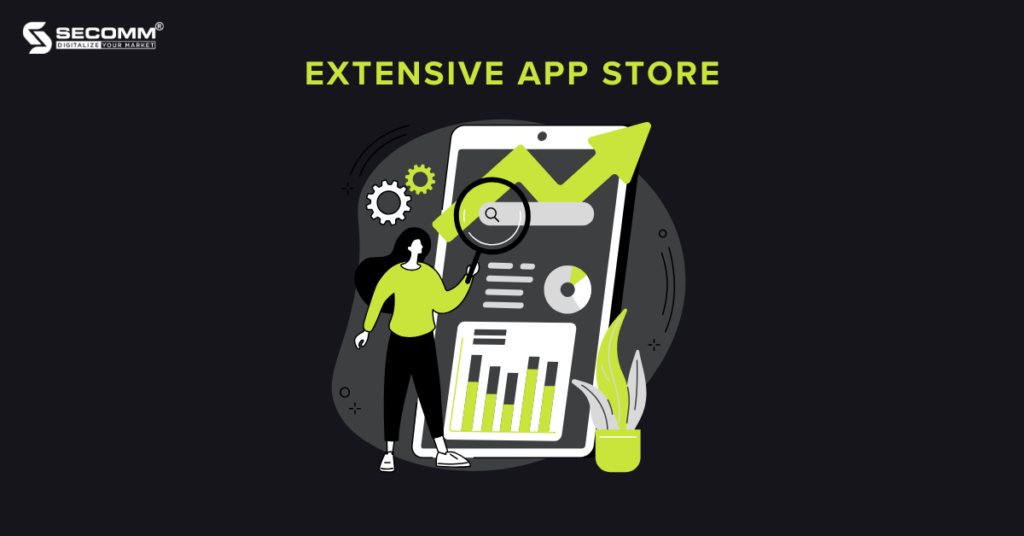
Beyond integrating with solutions within Shopify, you can also integrate with third-party systems such as:
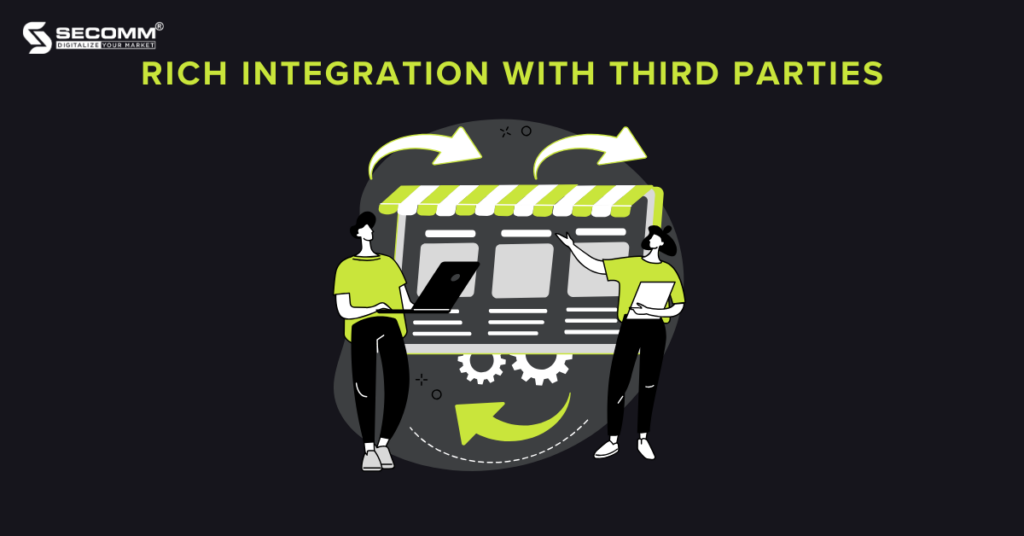
Shopify’s cloud infrastructure can cater to over 600,000 merchants and process speeds of up to 80,000 requests per second during peak periods. This system is built on a dedicated server cluster running Docker and utilizes Rails applications, alongside integrated additional features based on the AWS platform.
Therefore, Shopify Plus can provide powerful processing speed not only for the website but also during the checkout process. It can handle a massive number of visits while maintaining speed and ensuring a positive customer experience, processing over 10,000 orders per minute.
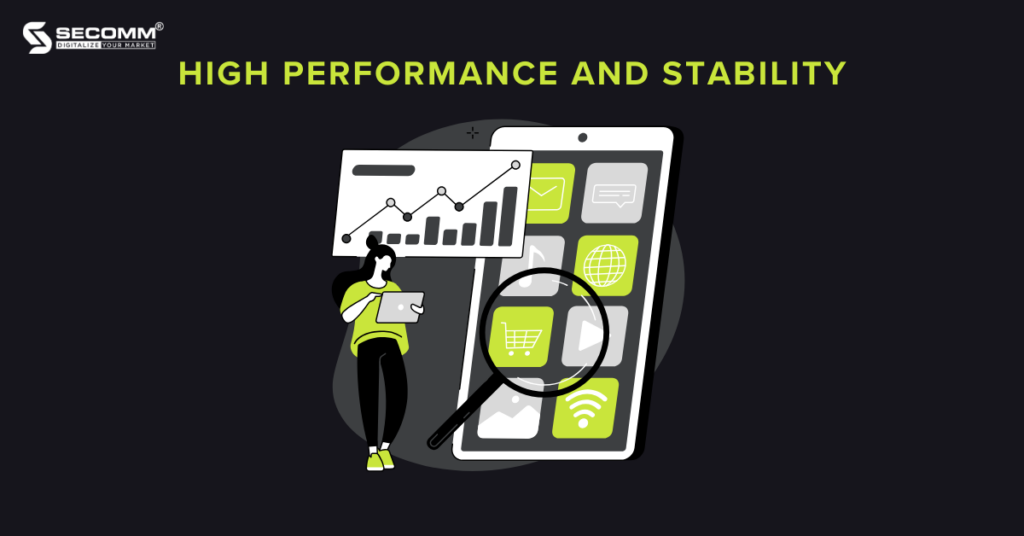
With unlimited bandwidth and flexible infrastructure, Shopify Plus can effortlessly scale to manage increased traffic during peak shopping seasons such as Black Friday, Cyber Monday, and Christmas. This enables you to handle high volumes of customers during peak times without concerns about technical issues or website disruptions.
The flexible customization of Shopify Plus also extends to providing maximum support for deploying Headless Commerce. Moreover, in 2021, the platform introduced the Hydrogen solution – an outstanding tech stack that can meet the highest requirements for building a Headless Commerce system.
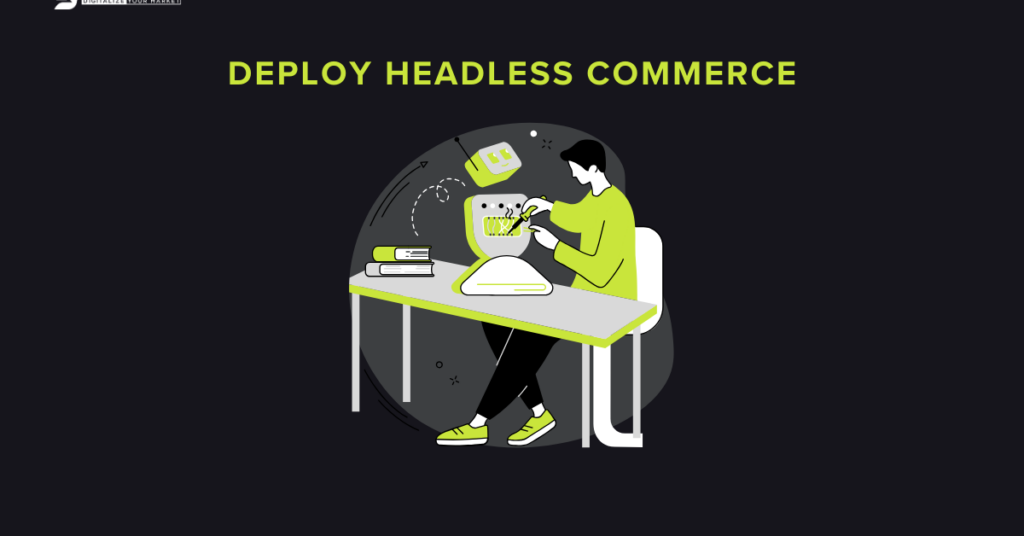
As the demand for flexibility and scalability continues to rise, alongside Headless Commerce, large businesses worldwide are increasingly focusing on the Composable Commerce model. Fortunately, Shopify is keenly attuned to customer needs and has recently introduced the Commerce Components by Shopify solution in early 2023.
As of the time of writing, Shopify stands as the first SaaS platform to provide a tech stack that can address nearly all the development needs of Composable Commerce.
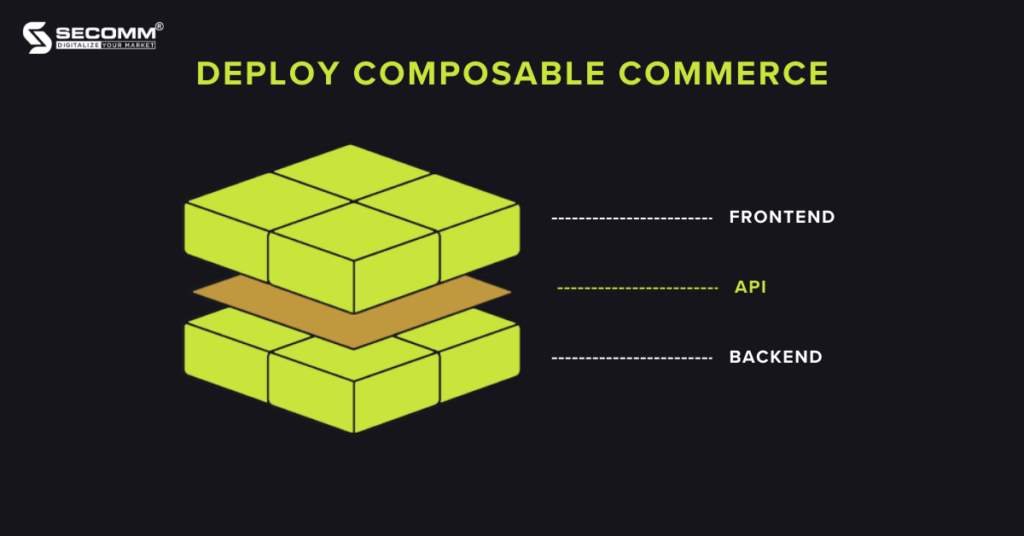
While you may require considerable time to tailor your Shopify Plus store to your specific needs, the nature of SaaS ensures that the go-live process for Shopify Plus remains quicker compared to open-source platforms like Magento.
On average, the deployment and go-live time for the Shopify Plus platform is around 2-5 months, whereas with Magento, businesses take from 6-12 months to deploy and go live.
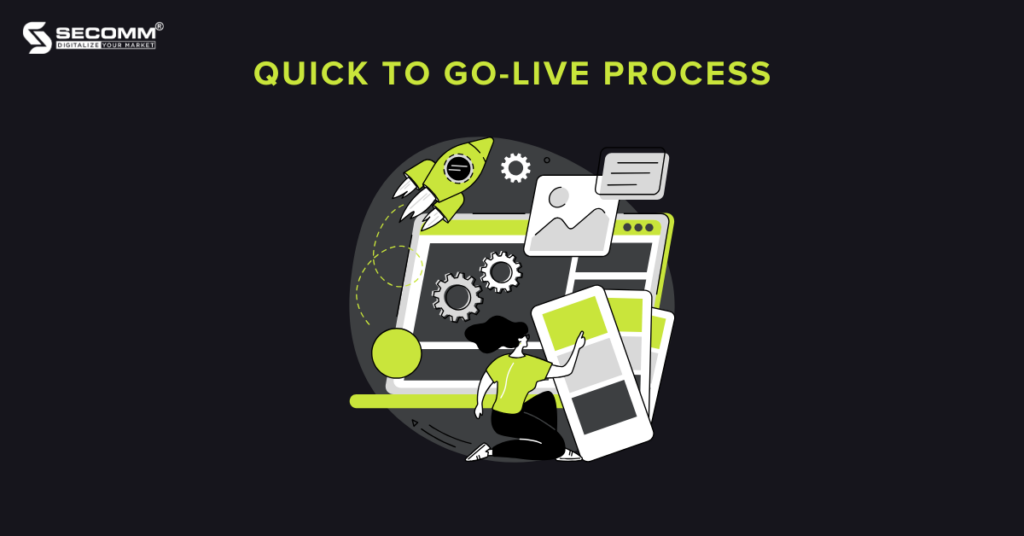
Shopify Plus provides a range of security measures and features to ensure that business data, customer information, and payment transactions are safeguarded to the highest extent possible. This includes:
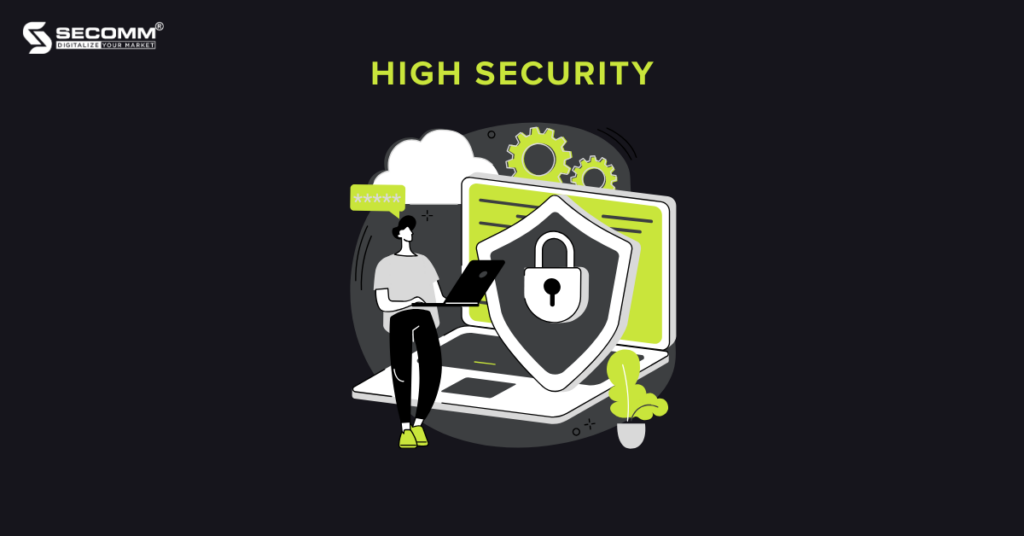
Similar to other eCommerce platforms, Shopify Plus provides businesses with 24/7 support through hotlines, emails, and video calls in various languages. Additionally, this platform offers instructional materials, API documentation, and the Shopify Plus Merchant Success program where businesses can access:
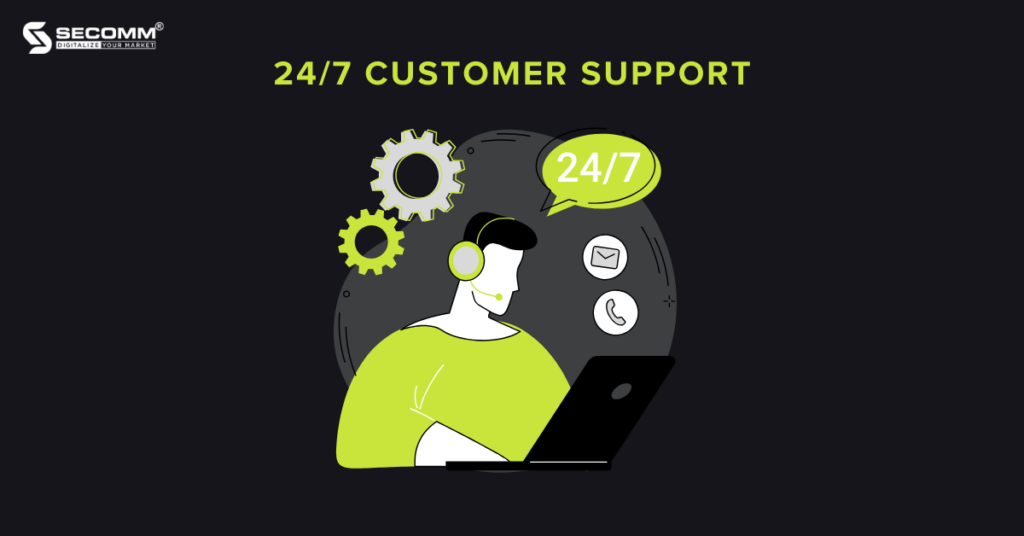
Shopify Plus has a vast and diverse user ecosystem, including businesses, developers, and marketing experts. With numerous leading global businesses choosing Shopify Plus as a key tool to drive their growth and success, it is undoubtedly a testament to the excellence of this platform.
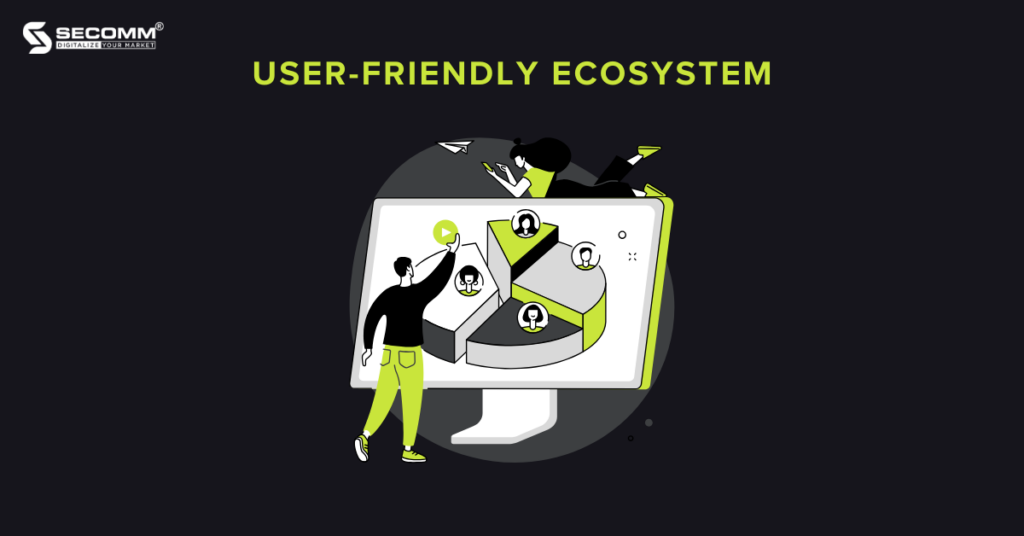
Renowned names such as Gymshark, Glossier, MZ Wallace, and Emma Bridgewater have leveraged the power of Shopify Plus to create customized shopping experiences, expand sales volumes, and reach a broader customer base. Their presence has added another reason encouraging you to switch to Shopify Plus.
With flexible customization, scalability, and support from a reliable team of experts, the decision to deploy eCommerce with Shopify Plus or migrate from another platform to Shopify Plus has been right for sustained and competitive growth in the eCommerce landscape.
Contact SECOMM or call the hotline at 028 7108 9908 for advice and support to swiftly and effectively switch to Shopify Plus.
 2
2
 6,814
6,814
 0
0
 1
1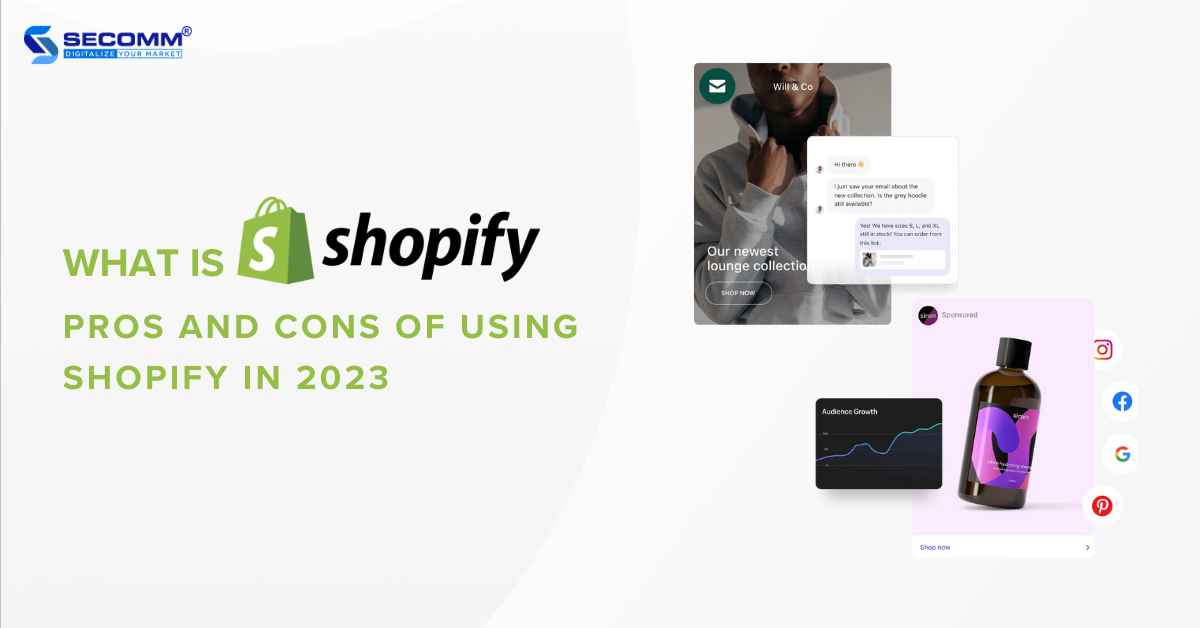
The eCommerce world is growing, and the significance of building and developing eCommerce websites has never been more crucial. Among the popular SaaS platforms, Shopify stands out as a name that commands attention.
Shopify is a SaaS platform and an outstanding solution that helps thousands worldwide turn their online business ideas into reality.
So, what is it? Why it is the top choice for eCommerce businesses, ranging from small-scale to large-scale operations. Let’s explore the power of Shopify in this article.
Shopify is a widely used eCommerce platform that allows businesses to build, develop, and manage their online store. With its user-friendly interface, even those with limited technical expertise can effortlessly navigate it easily.
Shopify operates as a Software as a Service (SaaS), requiring businesses to pay a monthly fee for usage and adhere to the platform’s regulations. However, the platform manages hosting and takes responsibility for technical issues, ensuring the security and efficient operation of the business’s eCommerce website.
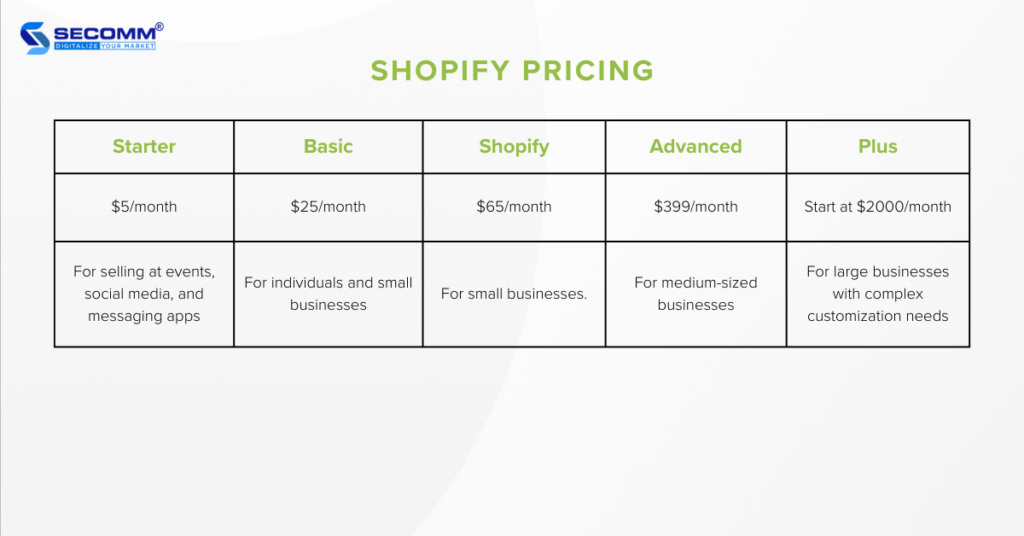
Until now, businesses have been familiar with 5 main solutions: Starter, Basic, Shopify, Advanced, and Plus. Recently, the platform introduced a new advanced solution called Commerce Components. This solution allows businesses to use the platform as a modular service, paying only for the features they need. It’s worth noting that this new solution is currently exclusive to the U.S. market.
For the Basic, Shopify, Advanced, and Plus plans, transaction fees are waived when businesses use Shopify Payments. However, in reality, this payment method isn’t available for all countries. Currently, it only supports countries in this list.
Conversely, transaction fees will apply at rates of 2%, 1%, 0.5%, and 0.15%, respectively. For the Starter plan, whether or not using it, transaction fees still apply and are relatively high at 5%.
Plus businesses using this payment method will enjoy no transaction fees. However, this exemption doesn’t apply to businesses in Austria, Belgium, and Sweden, even though these countries are included in the list.
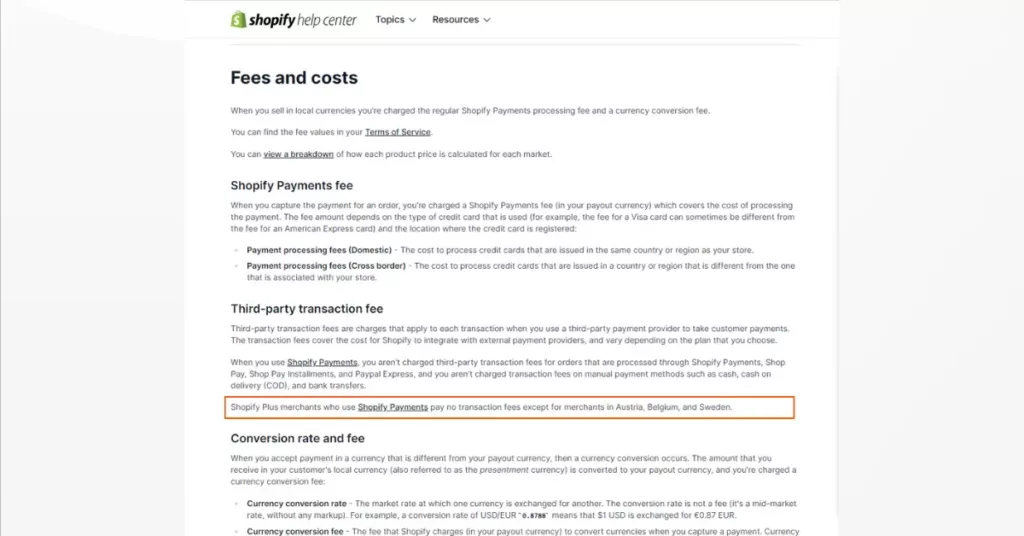
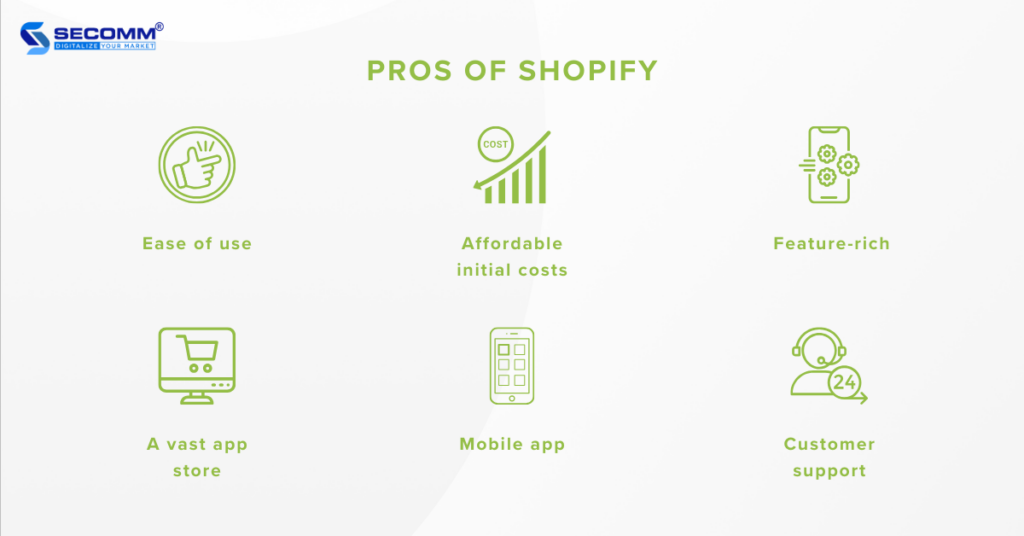
The platform is designed with an intuitive interface, allowing users with limited technical expertise to navigate it effortlessly. The platform offers a drag-and-drop editor, enabling businesses to easily add or remove products and make quick customizations.
Businesses also have the flexibility to customize layouts, colors, fonts, and font sizes, and add or remove elements and widgets from both free and premium themes.
Moreover, it offers businesses documentation and tutorial videos, ensuring a seamless and efficient setup and utilization experience.
The platform provides a range of cost-effective solutions suitable for startups and small to medium-sized businesses entering the eCommerce market. However, larger enterprises often prefer the Shopify Plus solution, given its reasonable costs of around $2,000, offering customization and scalability comparable to open-source platforms.
Moreover, as a SaaS platform, businesses pay a monthly fee for using it based on actual Gross Merchandise Volume (GMV), eliminating the need for a substantial one-time payment common with open-source platforms.
This is a versatile eCommerce platform suitable for businesses of all sizes and deployment needs. Whether for individuals, startups, or medium to large enterprises, it can provide features and tailored solutions to meet the specific needs of the business.
Some standout features that the platform brings to businesses include:
Beyond a diverse range of solutions and outstanding features, the platform offers businesses over 6,000 applications and integrations across various categories, from marketing, analytics, and shipping to inventory management and customer care. Each application is designed to address specific challenges and goals in the development of eCommerce.
Most applications and integrations in the App Store are developed by third-party businesses or independent developers. It provides resources, documentation, and tools for developers to create and release their applications on the store. While some apps offer a free version, it often comes with limited features, and businesses need to pay a monthly fee to access the full functionality.
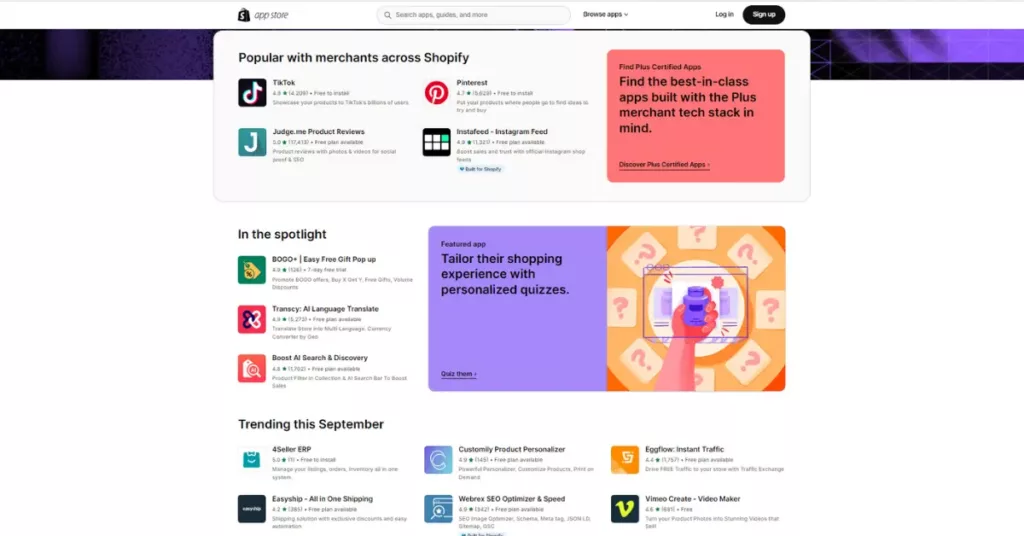
Compared to other SaaS platforms, Shopify provides businesses with up to three mobile applications for effective remote management of eCommerce operations:
The SaaS platform offers 24/7 customer support through chat, hotline, and email to address any customer issues throughout the eCommerce website development process. The level of support is equivalent for both small and large businesses. Moreover, it provides Shopify Experts services to offer businesses in-depth technical support, including web development, web design, marketing, and sales.
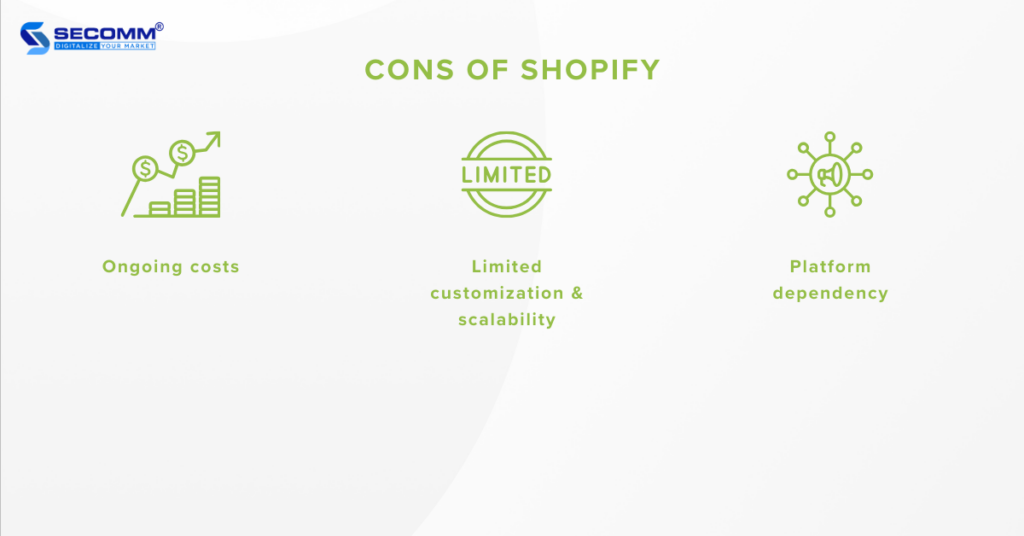
While the fees for using the plans seem reasonable, depending on the need for additional features, apps, or extensions, monthly costs may increase significantly, posing challenges for cash flow management, especially for larger businesses.
While this popular SaaS platform serves as a versatile eCommerce platform, its regular plans come with limitations in terms of customization and scalability. If a business requires a unique design or seeks freedom in designing the website interface, customizing themes on it can be restrictive and may require advanced programming skills.
Moreover, customizing third-party features and apps may add extra costs and dependencies. As an eCommerce website grows and expands, performance may be affected by increased traffic, accompanied by significant cost increases due to transaction fees (if not using Shopify Payments), app fees, and platform fees.
In such cases, the regular pricing plans (Basic, Shopify, Advanced) may not meet the business’s expectations for scalability, and businesses should consider transitioning to the Plus platform for long-term goals.
As a SaaS platform, Shopify has full control over the source code and data within the entire eCommerce website system. This means that all data related to the eCommerce operations will be locked into the platform’s database.
If it declares bankruptcy or ceases operations, all business data on this platform could be lost. However, this risk is highly unlikely. In the second scenario, when a business switches to another eCommerce platform, the exported data is typically provided in the form of a CSV file.
Get started with Shopify today!
When Tobias Lütke transformed Shopify from a snowboard-selling website to an eCommerce platform for businesses, he probably couldn’t have envisioned the significant impact it would have on the global business and technology landscape. The figure of 4.5 million active eCommerce websites is sure to increase substantially in the coming years.
Having accompanied many businesses, both domestically and internationally, in deploying Shopify website, the SECOMM team has accumulated extensive experience in web development and a deep understanding of the platform.
Contact SECOMM or call the hotline at 028 7108 9908 to get started!
 2
2
 7,433
7,433
 0
0
 1
1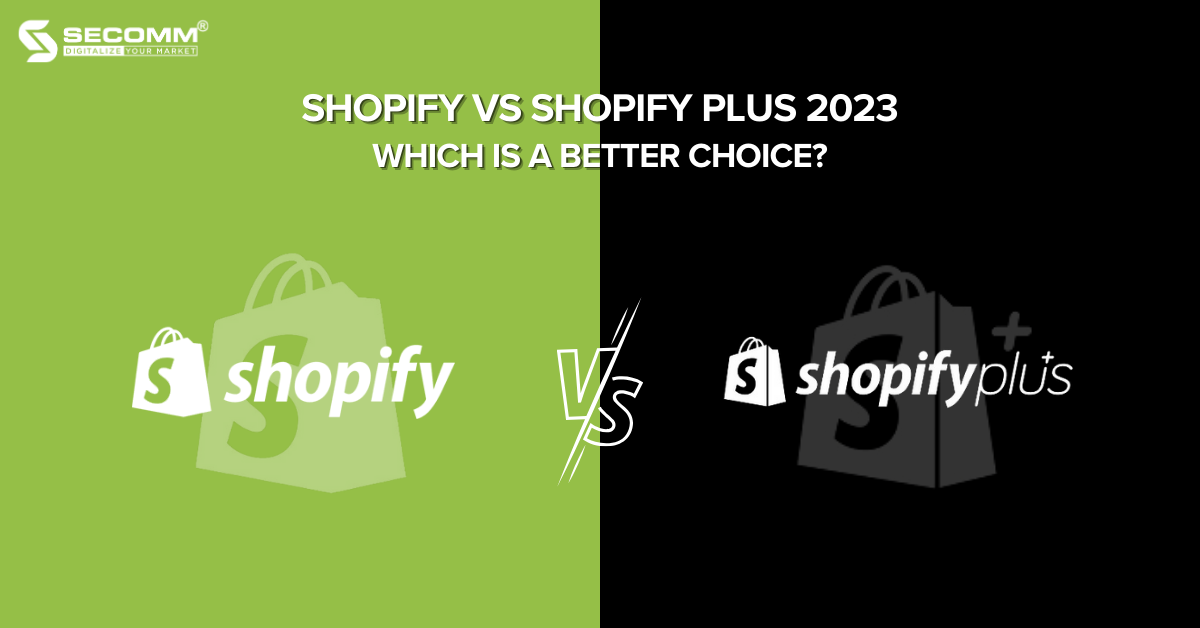
Shopify and Shopify Plus are two leading eCommerce platforms globally, used by millions of businesses to deploy eCommerce websites. The Shopify platform is designed for small and medium-sized enterprises, providing basic, user-friendly features for building and managing eCommerce websites. According to Builtwith, over 4 million active Shopify stores are currently worldwide.
On the other hand, Shopify Plus is specifically crafted for large-scale enterprises, offering advanced features, customization options, and flexible scalability. Builtwith statistics indicate that there are over 44 thousand active Shopify Plus websites globally.
What are the differences between Shopify and Shopify Plus? Which platform should you choose to build your eCommerce websites? This article will focus on clarifying the differences between Shopify and Shopify Plus in three aspects: cost, features, and support capabilities, to help you choose the most suitable platform for your needs and goals.
The first distinction and crucial criterion to consider between Shopify and Shopify Plus are the license fees and transaction fees. Shopify and Shopify Plus offer different solution packages with varying pricing to suit businesses with different budgets and scales.
Shopify offers three main pricing plans: Basic, Shopify, and Advanced, priced at $25, $65, and $399 per month, respectively. Also, Shopify has a special solution package called Shopify Starter at $5/month, enabling you to sell on social media and chat apps.
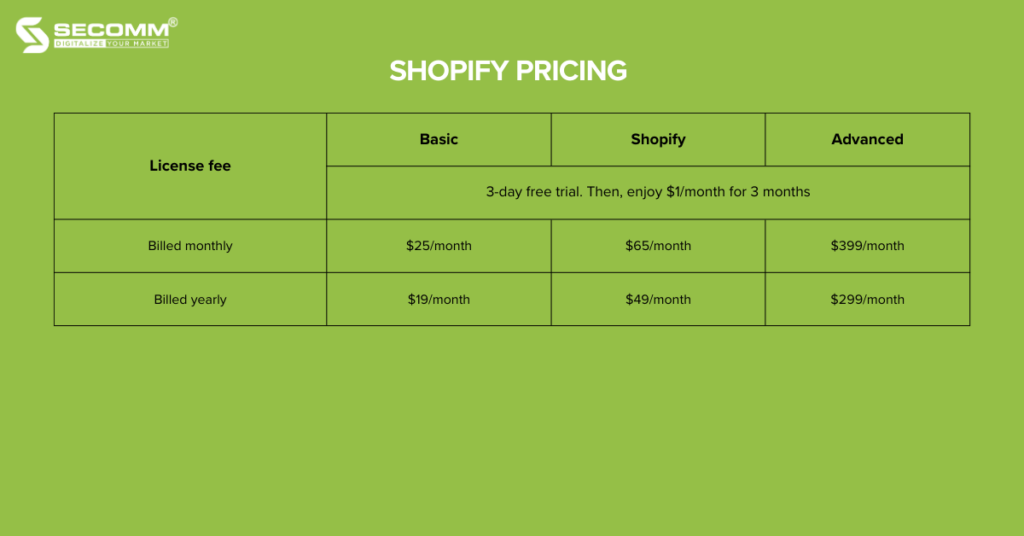
*Note: The mentioned fees apply to the Vietnamese market, and platform license fees may vary depending on the region or country.
Beyond the license fees, you also need to consider the transaction fee when using different payment methods. Shopify offers its payment method called Shopify Payments, allowing you to effortlessly accept all major payment methods on your eCommerce website.
If using Shopify Payments, you don’t have to pay any transaction fee to Shopify.
On the other hand, If you don’t use Shopify Payments and select one of many third-party payment service providers supported by Shopify, you’ll pay transaction fees of 2%, 1%, and 0,5% for the Basic, Shopify, and Advanced plans, respectively.
Since Shopify Plus is designed for large businesses, the pricing structure for the Shopify Plus package is variable and depends on the individual deployment requirements and revenue of each business. According to Shopify, the initial cost for using Shopify Plus is $2,000/month, with subsequent increases based on monthly revenue.
Specifically, when the revenue of a Shopify Plus store reaches $800,000/month, the platform will apply a charge of 0.25% of the monthly revenue. It’s worth noting that the fee will not exceed $40,000/month and $480,000/year.
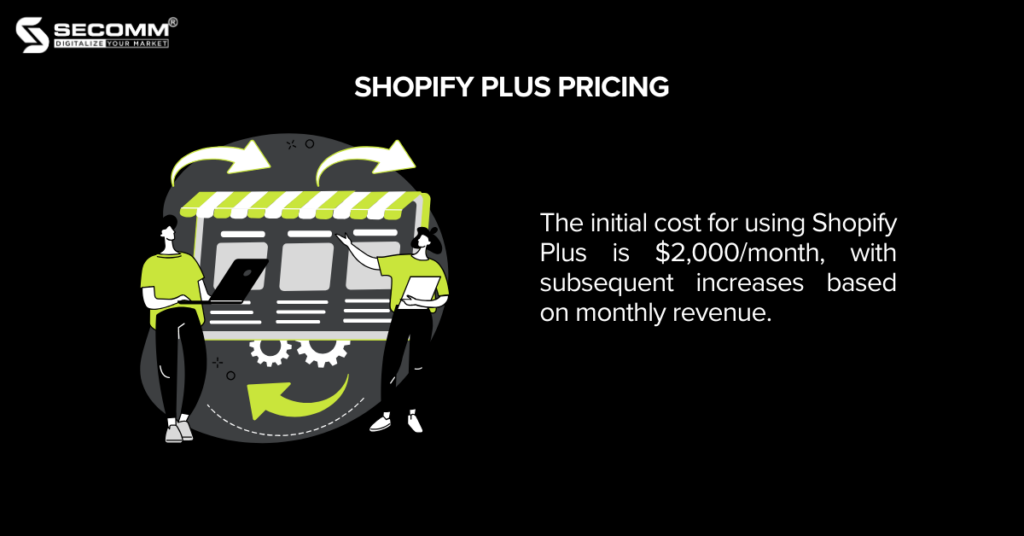
Similar to the Shopify pricing plans, Shopify Plus supports both Shopify Payments and third-party payment service providers. However, the transaction fees associated with Shopify Plus are lower compared to regular Shopify plans. If you don’t use Shopify Payments, you’ll incur a transaction fee of 0.15% on each transaction.
When it comes to features, Shopify Plus excels by providing a range of advanced features for you to customize your eCommerce websites, aiming to deliver a unique experience for customers.
Related Reading: 6 key Shopify Plus features
Most Shopify businesses typically utilize either the available free or paid themes on Shopify, encountering several limitations when customizing the checkout or cart pages. However, with the implementation of Shopify Plus, you can leverage Shopify Scripts to tailor small code segments, enabling the creation of a personalized shopping experience for customers at the cart and checkout pages.
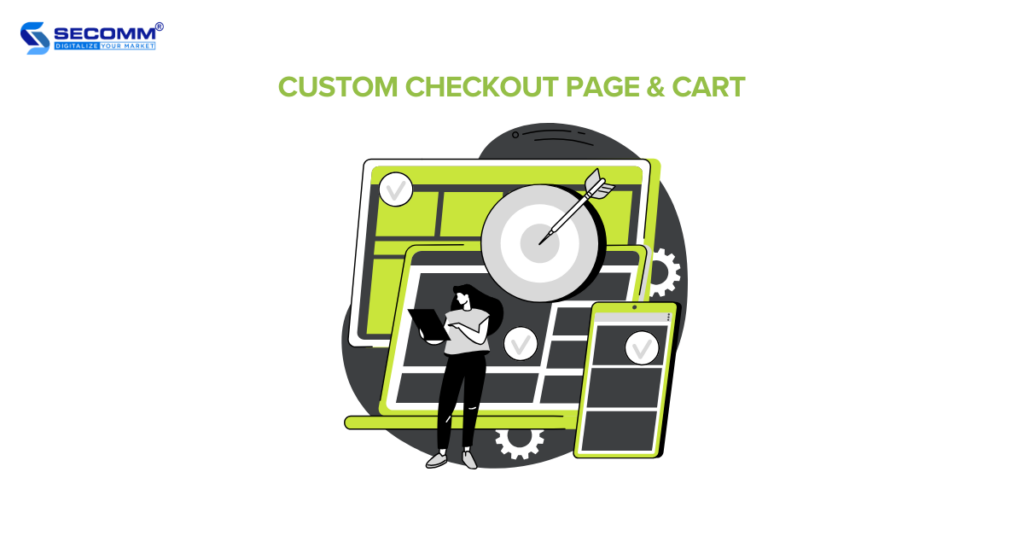
The Shopify pricing plans provide a set of built features for businesses to automate eCommerce and marketing operations. On the other hand, with the deployment of Shopify Plus, businesses can utilize specialized tools to automate eCommerce processes, such as:
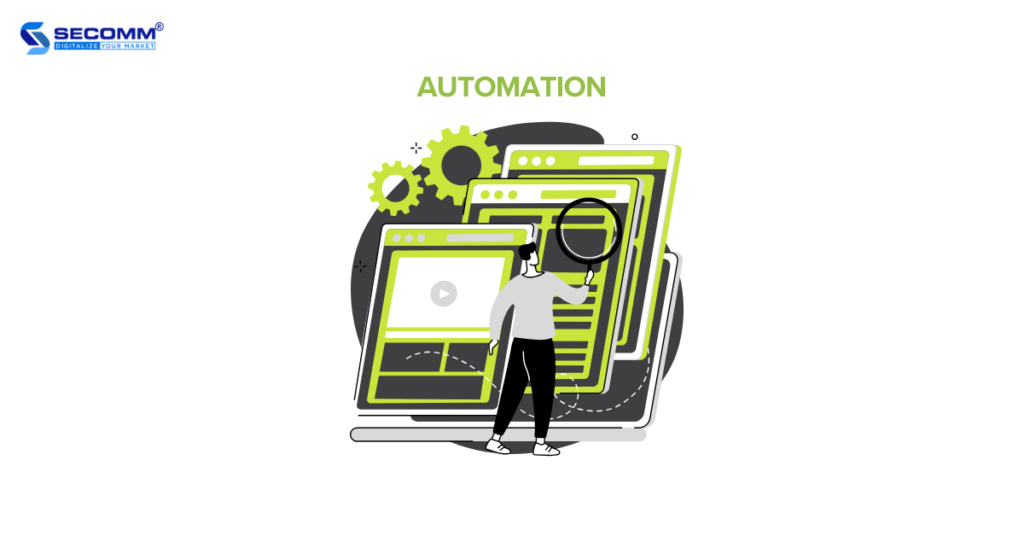
For all Shopify businesses, the Shopify POS feature is included in the standard service package known as POS Lite, but it has limitations in terms of features and POS usage locations. To unlock more advanced features and extend the POS capabilities, Shopify businesses need to upgrade to the POS Pro package, priced at $89 per month per location.
On the other hand, Shopify Plus businesses enjoy free access to POS Pro for their initial 20 locations. This implies that businesses implementing Shopify Plus can leverage advanced POS features, including BOPIS deployment, unlimited user accounts, omnichannel selling, inventory management, and more.
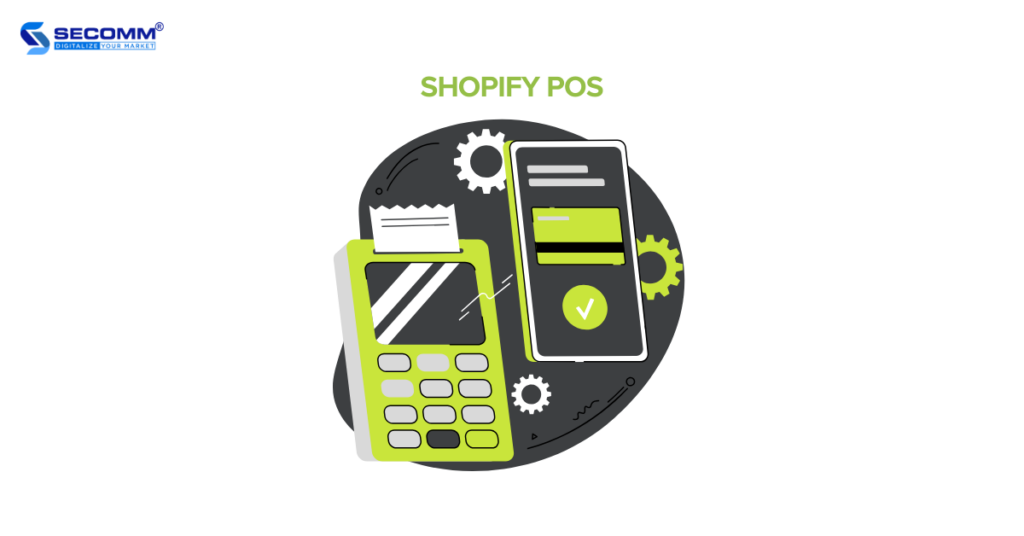
This feature is specifically designed for Shopify Plus businesses, facilitating B2B transactions directly through the eCommerce website without reliance on third-party apps or alternative solutions. You can set up catalogs, payment terms, and company profiles, and customize prices specifically for B2B customers.
This provides the flexibility to develop a website that serves B2B and B2C customers or craft a specialized platform dedicated to B2B clients.
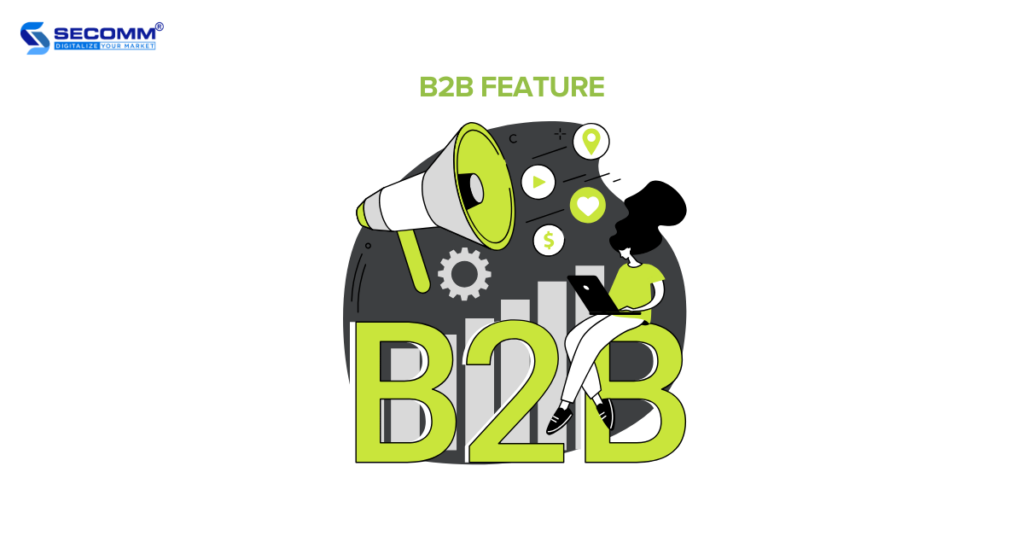
The wholesale feature is specifically designed for Shopify Plus merchants. This feature allows you to customize the wholesale website interface differently from the regular eCommerce site, adjust pricing, and establish a distinct ordering process specifically for wholesale customers. You can also choose to showcase products intended for wholesale transactions exclusively on the Shopify Plus wholesale website.
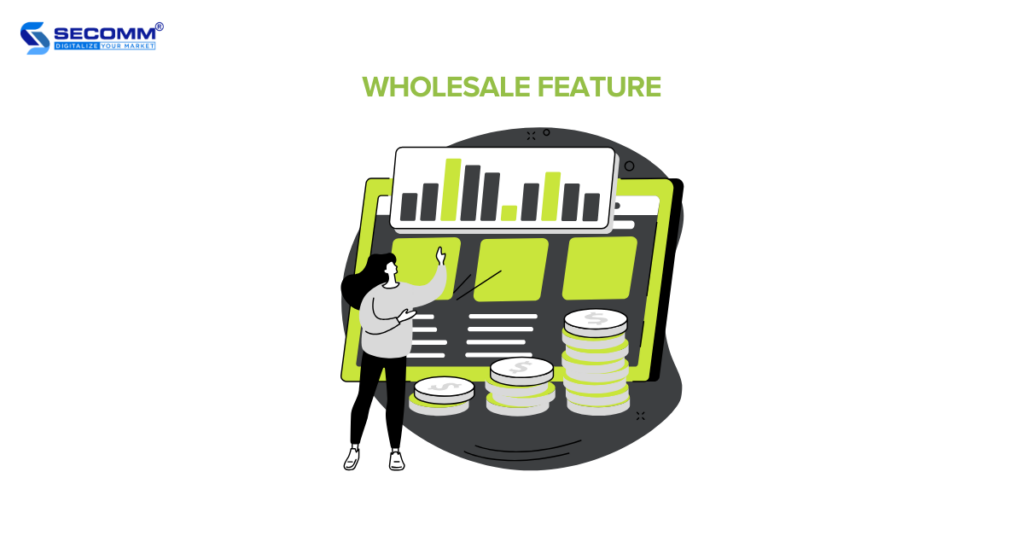
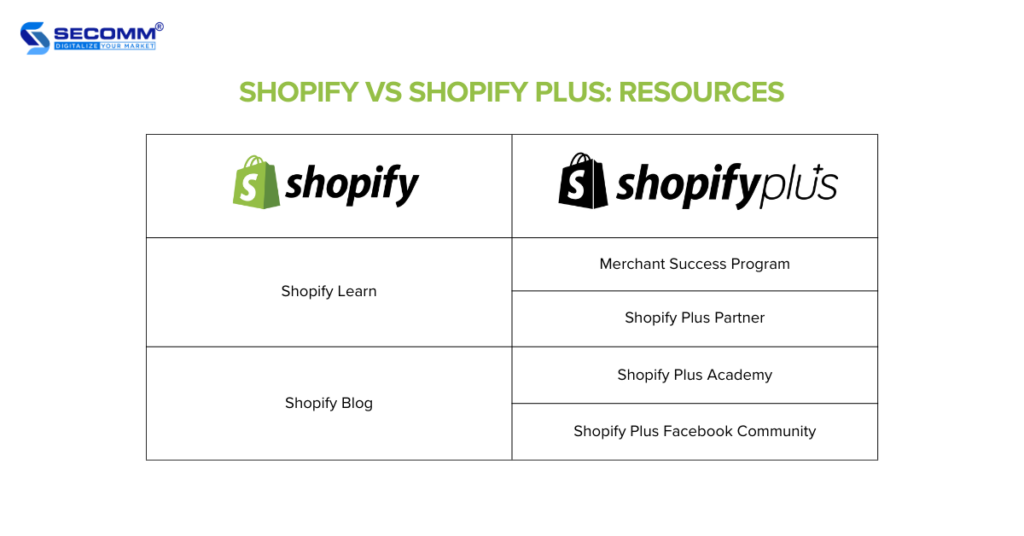
For Shopify businesses, they can access support 24/7 throughout the entire process of building and advancing their eCommerce website through channels like the hotline, email, or chatbox. Additionally, Shopify provides resources for businesses to enhance their eCommerce operations, including:
In addition to the support services available through the hotline, email, or chatbox, businesses utilizing Shopify Plus enjoy enhanced access to educational resources and support:
Here is an overview of the significant differences between Shopify and Shopify Plus platforms. The decision on which platform is most suitable depends on each business’s scale and deployment requirements.
For startups or small to medium-sized enterprises with minimal customization requirements and a desire for quick product launches, regular Shopify solutions may be more suitable.
On the other hand, large-scale enterprises with high integration and customization needs should prioritize Shopify Plus.
With years of experience deploying Shopify Plus eCommerce websites for leading businesses such as Vinamilk and Suzuverse, SECOMM boasts a professional team with exceptional technical skills and in-depth knowledge of the Shopify Plus platform.
Contact SECOMM or call the hotline at 028 7108 9908 to deploy Shopify Plus today!
 2
2
 6,209
6,209
 0
0
 1
1Subscribe to get the latest eBook!
Hotline